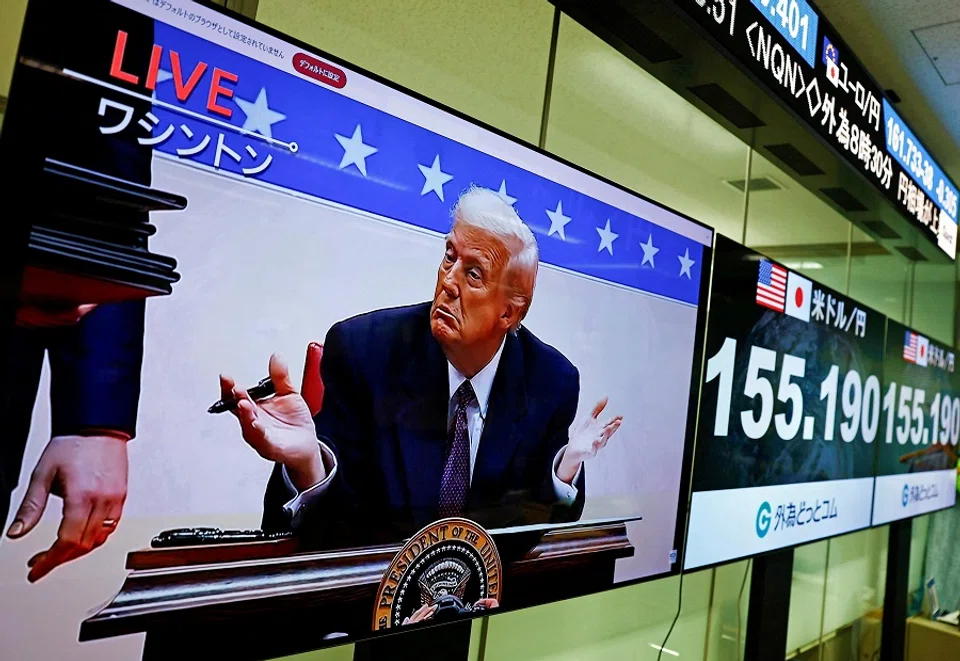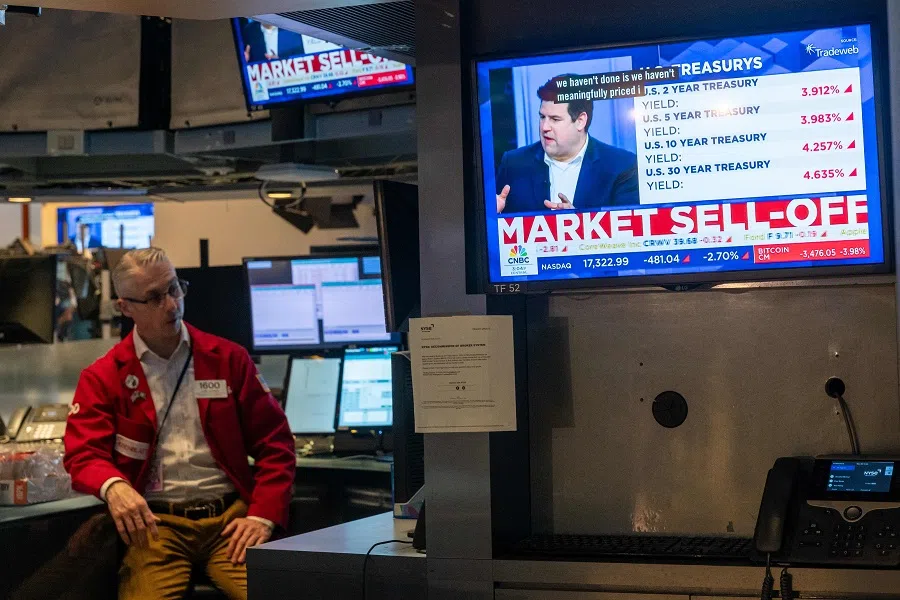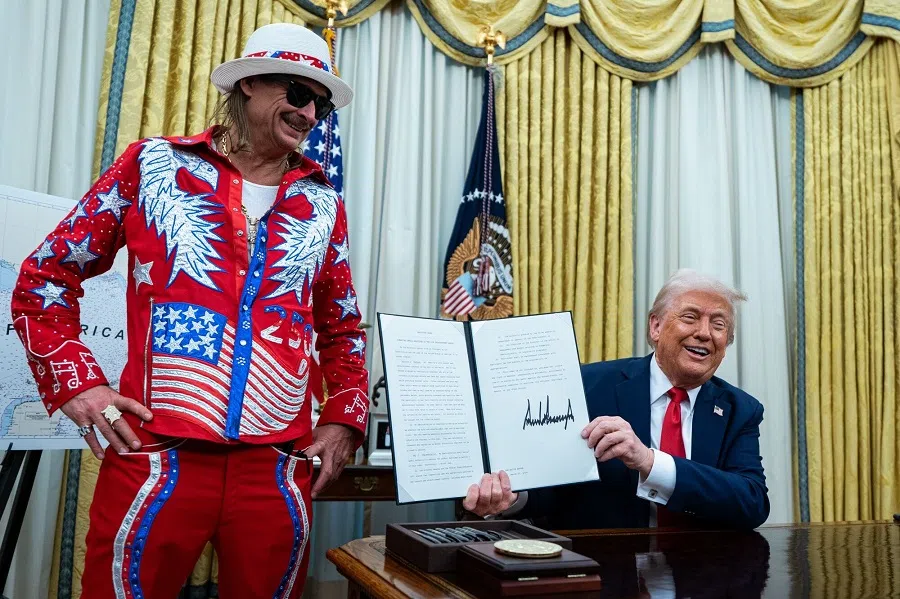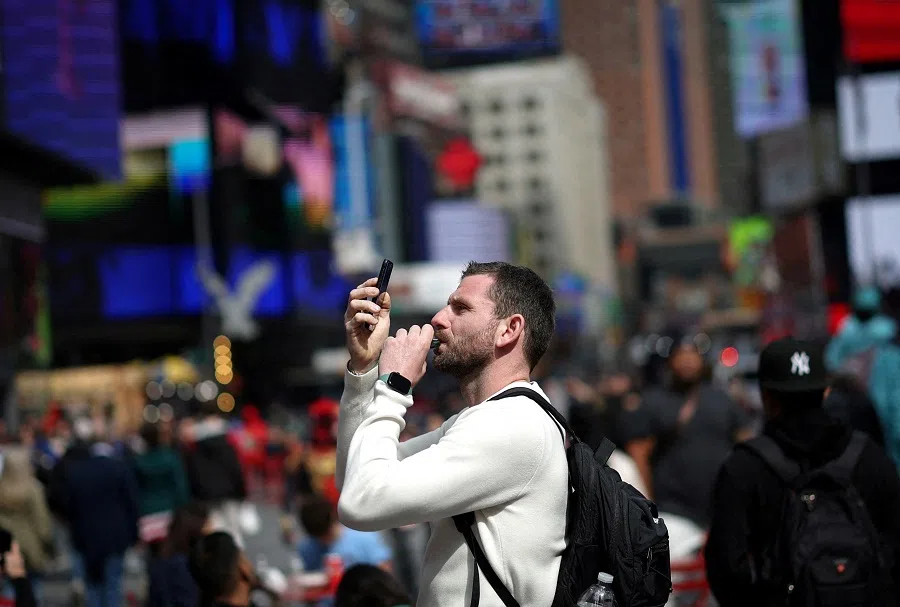The influencer-in-chief: How Trump tamed the social media beast
Extensive free speech protections and the advent of the internet and social media have rendered the US fertile ground for the rise of influencer leaders, argues academic Fei-ling Wang. Leading the charge is US President Donald Trump, says Wang, who tells us more about the recent political trend.

I have lamented more than once in Lianhe Zaobao that the 2024 US presidential election was unprecedented and full of peculiar developments. As anticipated, US President Donald Trump’s return to power has been marked by a flurry of unconventional moves over the past two months, leaving people in shock and awe. Supporters praise his actions as bold, strategic, and part of a grand scheme, while critics denounce them as reckless and counterproductive.
The nearly 80-year-old president aims to “Make America Great Again” (MAGA) by revitalising industries, improving social values, reducing taxes and burdens, and deporting illegal immigrants. However, he also has some slogans that I find more meaningful, concrete, and popular, such as implementing term limits for members of Congress and requiring full transparency in medical costs. Of course, whether these promises and slogans will be fulfilled or the extent to which they will lead to significant change remains uncertain. Will they become substantial reforms or merely remain part of a reality TV-style performance? Time will tell.
Elon Musk, who has been leading the charge, has attracted widespread hostility and resistance, leading to a staggering US$120 billion drop in his net worth.
All for naught?
So far, the most tangible achievement of the Trump 2.0 administration is arguably its rapid cuts to the federal government. While the scale of the cuts is significant, there has been no notable discovery of corruption or waste, and they are unlikely to truly reduce the massive US deficit and debt since the White House can only control a small portion of the federal budget. Elon Musk, who has been leading the charge, has attracted widespread hostility and resistance, leading to a staggering US$120 billion drop in his net worth.
On the international front, the near-global tariff wars — especially the erratic, tit-for-tat nature of the policies — have been dizzying. The actual impact remains unclear, but they have already caused the once-envied US stock market to plummet, wiping out over US$5 trillion in just three weeks — reportedly more than the total projected tariff revenue for the next decade. Facilitating a ceasefire between Russia and Ukraine could be considered a diplomatic success, though it is said to have come at a hefty price.

Meanwhile, the dramatic verbal spats with allies, especially the bizarre talk of annexing Canada and Greenland, may have affected the US’s international standing and image, making it seem as if the country is inexplicably self-sabotaging.
‘Trump phenomenon’
The “Trump phenomenon” has been making history for a decade. Trump is a man who is known for his flamboyant lifestyle, unrestrained behaviour, and entanglement in numerous controversies and lawsuits. He has also repeatedly declared bankruptcy in his real estate career and gained fame as a reality TV host. And yet, he has defied expectations.
Despite having no legal, military, or political background, he has firmly taken control of the Republican Party, transforming himself into a symbol of conservatism and tradition. His two-time occupancy of the White House has undeniably impacted, and perhaps even reshaped, both the US and the world.
Many years ago, I heard Trump’s grandiose words when he returned to speak at his alma mater, as a Democrat. More recently, in my book, I analysed his role as a Republican president in shaping US policy toward China. Now, I want to shift the focus and discuss how Trump managed to achieve such phenomenal success and why he governs with such an exaggerated, theatrical style.
... few political leaders have truly grasped its intricacies and capitalised on its potential like Trump, who has pioneered a new kind of internet-driven, influencer-style politics.
Rise of the influencer president
In my view, Trump’s electoral success and governing style are not primarily due to his values, policies, leadership skills, or even personal wealth. The real secret lies in his extraordinarily effective and almost compulsive use of media, especially the internet: a widely accessible, real-time, and low-cost information network designed to capture and sustain public attention.
The internet has been around for more than half a century, advancing rapidly over the past two decades and profoundly shaping how people learn, work, and live. It has introduced new opportunities, paradigms, and demands to American electoral politics. However, few political leaders have truly grasped its intricacies and capitalised on its potential like Trump, who has pioneered a new kind of internet-driven, influencer-style politics.

Trump has always been unconventional, often taking shortcuts and testing boundaries. His successes and failures, as well as his popularity and criticism, seem to go hand in hand. He possesses an exceptionally sharp and deep intuition for the internet’s unpredictable yet unprecedentedly powerful ability to promote, persuade, and mobilise.
His personality, public image, and life experience make him an almost perfect influencer-style leader, allowing him to naturally and effortlessly leverage the internet to generate hype, grab attention, and amass a loyal base. His crude yet cost-effective methods have enabled him to build an extraordinarily devoted following and secure votes with a level of mastery that far surpasses nearly all of his rivals.
... they are sure to lose in the modern electoral battlefield against a master like Trump if they fail to embrace or lack the skills to wield this unconventional yet formidable tool.
In contrast, norms of decorum and civility have been ingrained in traditional Democratic and Republican political elites, regardless of their credentials, experience, personal integrity, achievements, or political affinity. They take pride in their polished conduct and adherence to conventional rules, often dismissing or outright rejecting the raw, populist, and even occasionally vulgar political approach that thrives in the internet era. However, they are sure to lose in the modern electoral battlefield against a master like Trump if they fail to embrace or lack the skills to wield this unconventional yet formidable tool.
Trump, who was not originally considered a staunch conservative, has secured the Republican Party’s presidential nomination three times. A major reason for this is that the party’s so-called “conservative” political elites either refused, feared, or were simply incapable of becoming internet-driven influencer-style leaders.
Despite their disdain for Trump (with some even likening him to Hitler), most Republican figures — ranging from former President George W. Bush and former Vice President Dick Cheney, to rising stars such as current Secretary of State Marco Rubio and Vice-President J.D. Vance — have helplessly or wisely bowed to Trump.
The electoral miscalculation
Despite being dismissed by experts, Trump has won two presidential elections. His first victory over Hillary Clinton, a white female candidate, was a technical win — he lost the popular vote by 2.1% but secured the electoral college. His second victory over Kamala Harris, a woman of minority descent, was by a narrow margin of 1.5%. However, he lost to Joe Biden, a white male four years his senior, by 4.5%.
These results show that the Democratic Party may have misjudged the American public’s preferences regarding the gender and racial background of their leaders in the age of social media. They reveal that, after twice electing Barack Obama — a minority male president — American voters might now be ready for a female president. Furthermore, they demonstrate that even a rare, highly successful influencer-style leader like Trump could only go so far in the US elections, where the odds of victory actually appear to be not that big.
In the US, with its strong emphasis on free speech, certain characteristics of the American internet information system deserve special attention. It generates and disseminates information with minimal filtering, operating at an unprecedented level of efficiency and affordability, with low barriers to entry and astonishing speed. Those with resources and the willingness to invest can easily manipulate hot topics and dominate public attention.
This monster, unprecedented in the history of human information and communication, is the combination of a powerful echo chamber effect, an overwhelming flood of free content, and a deluge of misinformation and junk data existing simultaneously.

The new social media monster
Due to the enactment of Section 230 of the Communications Decency Act 27 years ago, the monopolistic platforms that control the market neither fear antitrust regulations nor bear legal responsibility for spreading false or deceptive information. This has allowed them to overpower traditional broadcast television and print media, which are still held accountable for accuracy.
In pursuit of profit, these platforms continuously produce and spread an endless stream of sensational stories — some true, some false. This, coupled with engagement algorithms and targeted advertising that tailor content to individuals — often driven by secretive AI-powered and fuelled by big data — has created a three-headed monster.
This monster, unprecedented in the history of human information and communication, is the combination of a powerful echo chamber effect, an overwhelming flood of free content, and a deluge of misinformation and junk data existing simultaneously.
Given the inherent flaws and vulnerabilities of mass elections — especially within America’s relatively “old” electoral system — the role and influence of the internet on US politics are both novel and profound. This reality calls for greater awareness and adaptation.
People lack the inclination, means or time to fact-check or analyse the information they consume. As a result, extreme, shocking, and sensational statements thrive, capturing attention and driving engagement. Making outlandish claims, committing fraud, and even saying outright falsehoods often go unpunished; in fact, such actions often yield significant rewards. Manipulating the internet for influence has become routine; in recent years, even foreign governments have increasingly sought to use American internet platforms to interfere in US elections.
Online influencers thrive on performance, shock value, and dramatic impact. Political influencer-leaders operate the same way — perhaps, in this landscape, they have no choice but to do so. Given the inherent flaws and vulnerabilities of mass elections — especially within America’s relatively “old” electoral system — the role and influence of the internet on US politics are both novel and profound. This reality calls for greater awareness and adaptation.
This article was first published on Lianhe Zaobao as “美式互联网与美式普选”.

![[Big read] Paying for pleasure: Chinese women indulge in handsome male hosts](https://cassette.sphdigital.com.sg/image/thinkchina/c2cf352c4d2ed7e9531e3525a2bd965a52dc4e85ccc026bc16515baab02389ab)


![[Big read] Love is hard to find for millions of rural Chinese men](https://cassette.sphdigital.com.sg/image/thinkchina/16fb62fbcf055b710e38d7679f82264ad682ce8b45542008afeb14d369a94399)
![[Big read] How UOB’s Wee Ee Cheong masters the long game](https://cassette.sphdigital.com.sg/image/thinkchina/1da0b19a41e4358790304b9f3e83f9596de84096a490ca05b36f58134ae9e8f1)